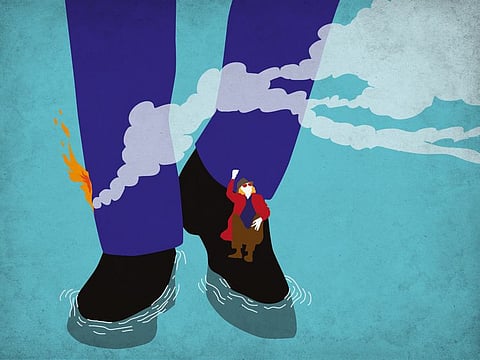The climate emergency is a political emergency
US is failing to act despite broad consensus that climate crisis demands profound change


It should come as no surprise that I believe in the power of protest. That’s why I moved to Washington to start what I call Fire Drill Fridays, joining the millions of young people around the world who turned out in the fall for protests to demand that our leaders act to save their futures.
We must all face the harsh reality that our planet is rapidly approaching an irreversible tipping point, beyond which the unravelling of our ecosystems will be beyond our control. Scientists have made clear that we now have less than 11 years to reduce fossil fuel and other greenhouse gas emissions roughly by half, and 20 years after that to cut them to net zero, to stabilise the rise in temperatures by the end of the century and meet the goal of the Paris agreement on climate change.
Last summer — as the wildfires wreaked havoc on my home state, California, and young people like Greta Thunberg so powerfully reminded us that we are the last generation that can prevent an unthinkable global catastrophe — I decided it was time for me to do more.
Each of us one day will have to answer this question: What did I do to protect the planet for our children, grandchildren and so many precious species while we still had time?Jane Fonda, Hollywood actress and climate activist
There are many things we can all do. We can join protests, engage in civil disobedience and risk arrest, but we must also see this as the uniquely critical political moment it is.
Despite widespread agreement among the world’s scientists that we are living through a climate emergency requiring profound economic and social change, the United States government is failing to act. It’s not that the American public doesn’t want an end to wars over oil, or a stable climate, clean oceans, safe and abundant water and healthy air.
No. Let’s be clear: Over decades the fossil fuel industry has hijacked our political system, and we have failed to elect enough leaders who are not beholden to the industry’s interests. The Centre for Responsive Politics has documented that the oil and gas industry alone has spent some $218 million (Dh800 million) on lobbying in 2018 and 2019. In addition, oil and gas interests have contributed about $27 million to Senate and House candidates and party committees in the 2020 election cycle. Fossil fuel interests are subverting our democracy.
In just the past year, the United States has experienced deadly wildfires, devastating flooding and the hottest month ever recorded, all driven, at least in part, by climate change. What is President Trump’s response? He’s pulling the United States out of the Paris agreement and rolling back 85 environmental safeguards, including important and consequential climate initiatives. This should not be surprising; he once called climate change a “hoax.” The Senate majority leader, Mitch McConnell, is also blocking efforts to deal with the climate crisis.
Americans have reached a time in this fight when the only way forward is to organise, mobilise and vote politicians who won’t act out of office. We must overcome the power of the fossil fuel industry and elect an environmental champion for president and a congressional leadership ready to move forward aggressively with a Green New Deal to save us and the planet, starting the day they take office.
Winning at the ballot box is how we will succeed in building a more just and equitable economy, one thriving from good clean energy jobs. It’s how we will secure a habitable planet for future generations. It’s how we will protect our cherished public lands and species, and ensure all Americans have safe water and clean air — especially low-income communities and communities of colour who for too long have borne the brunt of inaction.
Also Read: ‘We must choose hope or climate surrender’
Also Read: Climate: We have run out of time
The good news is that a growing number of voters understand the urgency of the challenge we face. Two-thirds of Americans say the government is doing too little to reduce the effects of climate change, including 90 per cent of Democrats and 39 per cent of Republicans, according to a recent Pew Research Centre survey. Some Democratic presidential candidates have released climate plans that match the urgency of the crisis. We must pressure others to do the same. We must not vote for any candidate who accepts money from the fossil fuel industry.
Greenpeace is ranking the candidates based on their support for the Green New Deal and ending new fossil fuel extraction immediately. Through the Change the Climate 2020 programme, the League of Conservation Voters is tracking what every candidate is saying about climate change. The group’s political committee, the LCV Victory Fund, is scaling up campaigns in battleground states. I’ve seen the details of the strategy and I’m telling you we can win on climate.
We must start to live our lives as if this is an emergency, because it is. Each of us one day will have to answer this question: What did I do to protect the planet for our children, grandchildren and so many precious species while we still had time?
I’ve still got a lot of fight left in me. I will not look back on November 4, 2020, the day after the election, and wonder what more I could have done.
— Hollywood actress Jane Fonda is leading Fire Drill Fridays, civil disobedience at the United States Capitol to call for action to address climate change.



